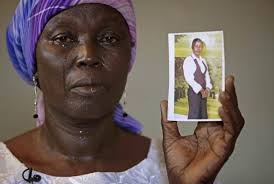South African Olympic and Paralympic track star Oscar Pistorius is led to holding cells after he was sentenced at the North Gauteng High Court in Pretoria October 21, 2014. A South African judge on Tuesday sentenced Pistorius to five years in prison for the negligent killing of his girlfriend Reeva Steenkamp on Valentine’s Day last year
For those for whom the trial of Oscar Pistorius was no more than the essential television event of the year, the ending did not disappoint, at least in cinematic terms.
Framed by the barred window of the prison van, darkened by the glare of the midday sun, the outline of the athlete, dark suit, dark tie, head erect, slowly driven away, finally a prisoner of the state.
It is only a short drive to the Kgosi Mampuru II prison, where Pistorius will have exchanged his dark suit for an orange uniform, and been taken to the hospital section where he is expected to be detained.
It would have required a quite extraordinary turn of events, at some point over the last 20 months, for it not to end this way. The arguments, laid out at exorbitant cost in front of a watching world, have only really been over the precise nature of the crime – premeditated murder, or something less – and the length of time it should merit.
In the end, Judge Thokozile Masipa handed down a sentence of five years as punishment for the culpable homicide conviction she gave last month. The provisions of South African law make clear Pistorius will be eligible to have his sentence commuted down to corrective supervision, or house arrest, after a sixth of that time, 10 months. His defence counsel has indicated it expects that to happen at the earliest opportunity, but it is not automatic.
In the end, the sentence fell almost exactly between the three years’ house arrest his defence had argued for, and the minimum 10 years custodial that the prosecution had requested. Oscar Pistorius’s family has indicated he will not appeal.
 Parents of the late Reeva Steenkamp Barry and June, front, arrive at the court in Pretroia South Africa, Tuesday, Oct. 21, 2104
Parents of the late Reeva Steenkamp Barry and June, front, arrive at the court in Pretroia South Africa, Tuesday, Oct. 21, 2104
State Prosecutor Gerrie Nel said he considered it “the end of the case”, but South African prosecuting authorities may yet appeal the verdict. Not the sentence, the verdict.
Judge Masipa said Pistorius’s actions were so negligent they were “very close” to second-degree murder, or dolus eventualis, as the South African legal system terms it. There are many South African legal experts of the view that it was more than “very close”, and a case can certainly be made. The National Prosecuting Authority has already indicated it has the “appetite” for an appeal. It has 14 days to indicate if it will do so.
Already, the International Paralympic Committee has said it will ban Pistorius from its competitions for five years. If it does so, the Olympic Committee will surely have to do the same. That time frame moves long beyond when the greatest and most inspirational Paralympian in history was planning to retire. Whenever he swaps prison cell for his uncle’s house in the suburbs, the career of Oscar Pistorius is all but over, and the idea of him – now known to be rather different from the reality – is over, too.
The Steenkamp family, whose mother June and father Barry have attended court for much of the proceedings for more than a year, insisted they have forgiven the man who killed their daughter and said they were “happy” with the verdict.
For his part, Pistorius appeared arguably the most composed he has been throughout the trial as he stood to hear his sentence. If there was any expression to be seen in his face, it was one of relief, not necessarily at the sentence itself, but that the process was finally over. He would have been told, almost certainly, to expect a custodial sentence, and he stopped only to hold his uncle Arnold briefly by the hands before descending to the holding cells.
Judge Masipa made clear in her sentencing, which lasted around an hour, that “there may be more than one appropriate sentence in a case. An appropriate sentence by a trial judge need not be the only appropriate sentence.”
That neither side erupted with either delight or anger as she delivered her sentence suggests she struck the correct balance. Arnold Pistorius said in a statement that the athlete would “embrace this opportunity to pay back to society”.
“This has been an incredibly hard and painful process for everyone involved, the Steenkamp family, our family and Oscar,” he added.
The sentence, as Judge Masipa explained, had to “show an element of mercy”. Certainly there is little risk of Pistorius re-offending, and his reaction in court made clear he is less concerned by what will happen to him than he is traumatised by the fate he delivered to his girlfriend, in what he described under cross-examination as “the moment that everything changed”.
In the hospital section, Pistorius is likely to be spared the worst of life in what has been described as a “hell hole” prison. If he does serve 10 months there, that is only a little longer than the course of this trial.
As the court room slowly cleared, two white roses brought by a Pistorius supporter were placed in the dock, on the bench where he sat. On the floor next to it was the notorious green bucket, into which he has retched and vomited seemingly for months on end, as the horrific injuries he inflicted on a beautiful young model who “lived life to the full” were discussed, described and in one horrifying moment, shown for all to see.
One night in to his sentence, Pistorius may already be over the worst.














